
|
Now Playing

It Happened in 1923 . . .
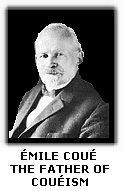 It was the best of times but everybody wanted something even better. The welcome mat was out not only for the super-salesmen in the Get-Rich-Quick marts but even for the sweet-talker who was peddling nothing more than Peace of Mind, 1923-style. Thus �mile Cou� was hailed as something just short of the Messiah when he stepped off the boat from France. The bearded pharmacist had a prescription for lasting happiness, called autosuggestion and packaged it in twelve little words--"Day by day in every way I am getting better and better." Mr.Cou� said it would work on any man--or even any woman--who kept repeating it.
It was the best of times but everybody wanted something even better. The welcome mat was out not only for the super-salesmen in the Get-Rich-Quick marts but even for the sweet-talker who was peddling nothing more than Peace of Mind, 1923-style. Thus �mile Cou� was hailed as something just short of the Messiah when he stepped off the boat from France. The bearded pharmacist had a prescription for lasting happiness, called autosuggestion and packaged it in twelve little words--"Day by day in every way I am getting better and better." Mr.Cou� said it would work on any man--or even any woman--who kept repeating it.
We go a little deeper in our time, what with the big boom in couches and psychiatrists, but in the New Era a man like M. Cou� could live pretty well on a simple phrase with a touch of yoga in it. People jammed the lecture halls to hear the little Frenchman's magic formula in person. Others rushed to newly-organized Cou� Institutes to make sure they had the twelve words right. But like anything else, Americans being such fickle lovers, Cou�ism didn't last. After a while people were making jokes about it, such as the one about the woman who went to M. Cou� with a problem:
WOMAN: My husband thinks he's sick. He's always complaining.
M. COU�: Simple. You just tell him that day by day in every way he is
getting better and better.
WOMAN (a few days later): I'm sorry but I have even worse trouble now.
M. COU�: What is it, my dear lady?
WOMAN: Now my husband thinks he's dead.
It was all in fun, of course. But M. Cou� went home after a while.
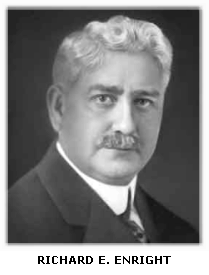 New York's Great White Way rejoiced because Police Commissioner Richard E. Enright extended the dancing curfew from 1:00 A.M. to 2:00 A.M. . . . The dance marathon, an import from Europe, began to sweep the country. A high-stepper in Tonawanda, New York, dropped dead on his eighty-seventh hour. Chicago in 1930 would stage a marathon that would go on-and on and on--for 3,327 hours . . . Greta Gustafsson made a movie in Sweden; in American movies she would be known as Greta Garbo . . . Portable radios for cars, set in clumsy wooden cases, made their bow . . . President Coolidge freed the last of the political prisoners . . . The Ouija Board was selling like hotcakes . . . Henry R. Luce and a Yale classmate, Briton Hadden, started Time . . . Norman Mailer was born in Long Branch, New Jersey . . . Earl Sande won twenty-nine stake races worth a half million dollars in purses--but the great jockey was broke when he died in
1968 . . .
New York's Great White Way rejoiced because Police Commissioner Richard E. Enright extended the dancing curfew from 1:00 A.M. to 2:00 A.M. . . . The dance marathon, an import from Europe, began to sweep the country. A high-stepper in Tonawanda, New York, dropped dead on his eighty-seventh hour. Chicago in 1930 would stage a marathon that would go on-and on and on--for 3,327 hours . . . Greta Gustafsson made a movie in Sweden; in American movies she would be known as Greta Garbo . . . Portable radios for cars, set in clumsy wooden cases, made their bow . . . President Coolidge freed the last of the political prisoners . . . The Ouija Board was selling like hotcakes . . . Henry R. Luce and a Yale classmate, Briton Hadden, started Time . . . Norman Mailer was born in Long Branch, New Jersey . . . Earl Sande won twenty-nine stake races worth a half million dollars in purses--but the great jockey was broke when he died in
1968 . . .
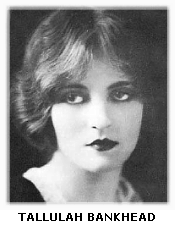 Tallulah Bankhead, unhappy with her notices from the New York critics, went to London and scored a smash in The Dancers . . . Hart Crane was working on his quasi-historical poem, The Bridge, but it would not be published until 1930 . . . Nicola Sacco went on a thirty-one-day hunger strike in a Massachusetts prison . . . Sarah Bernhardt died in Paris at seventy-eight . . . A. Conan Doyle, creator of Sherlock Holmes, came to the States with a photograph purportedly showing the faces of the war dead peeking in on a memorial service in London. Sir Arthur had strong connections in the spirit world . . . Britain barred boys and girls under eighteen from drinking in the pubs.
Tallulah Bankhead, unhappy with her notices from the New York critics, went to London and scored a smash in The Dancers . . . Hart Crane was working on his quasi-historical poem, The Bridge, but it would not be published until 1930 . . . Nicola Sacco went on a thirty-one-day hunger strike in a Massachusetts prison . . . Sarah Bernhardt died in Paris at seventy-eight . . . A. Conan Doyle, creator of Sherlock Holmes, came to the States with a photograph purportedly showing the faces of the war dead peeking in on a memorial service in London. Sir Arthur had strong connections in the spirit world . . . Britain barred boys and girls under eighteen from drinking in the pubs.
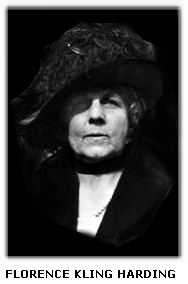 The first transatlantic radio news dispatches were broadcast to England from New Jersey . . . In Columbia, Missouri, fifty women attended the hanging of a Negro accused of assaulting a fourteen-year-old girl . . . The Senate voted a $5,000 annual pension to President Harding's widow . . . Henry Ford said no, he would not run against Calvin Coolidge for President . . . Thomas E. Dewey was graduated from the University of Michigan . . . Bad liquor killed fourteen persons during the New Year's celebration in York . . . Dr. Ales Hrdlicka, a leading anthropologist, said that man did not descend directly from the ape we knew then but had his origin 400,000 years�ago in Europe . . . Clarence Darrow and William Jennings Bryan debated fundamentalism vs. evolution in the Chicago Tribune . . . The Equal Rights Amendment for Women was introduced in Congress and would go into the hopper every year thereafter before the House embraced it, 350 to 15, in 1970 (Women's Lib, you know) . . . U.S. Steel abolished the
twelve-hour day and came down to ten . . .
The first transatlantic radio news dispatches were broadcast to England from New Jersey . . . In Columbia, Missouri, fifty women attended the hanging of a Negro accused of assaulting a fourteen-year-old girl . . . The Senate voted a $5,000 annual pension to President Harding's widow . . . Henry Ford said no, he would not run against Calvin Coolidge for President . . . Thomas E. Dewey was graduated from the University of Michigan . . . Bad liquor killed fourteen persons during the New Year's celebration in York . . . Dr. Ales Hrdlicka, a leading anthropologist, said that man did not descend directly from the ape we knew then but had his origin 400,000 years�ago in Europe . . . Clarence Darrow and William Jennings Bryan debated fundamentalism vs. evolution in the Chicago Tribune . . . The Equal Rights Amendment for Women was introduced in Congress and would go into the hopper every year thereafter before the House embraced it, 350 to 15, in 1970 (Women's Lib, you know) . . . U.S. Steel abolished the
twelve-hour day and came down to ten . . .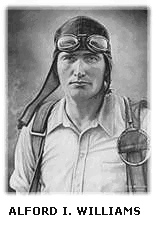 A federal judge ruled that the Prohibition Law did not limit the number of liquor prescriptions doctors could write . . . Navy Lieutenant Alford I. Williams, a former Giant pitcher, flew a Curtiss monoplane 243.67 miles per hour--a new world's speed record . . . Ex-President Wilson charged that our isolation form our allies was "cowardly and dishonorable." A federal judge ruled that the Prohibition Law did not limit the number of liquor prescriptions doctors could write . . . Navy Lieutenant Alford I. Williams, a former Giant pitcher, flew a Curtiss monoplane 243.67 miles per hour--a new world's speed record . . . Ex-President Wilson charged that our isolation form our allies was "cowardly and dishonorable."
In New York the feud between the murderous gangs of Nathan (Kid Dropper) Kaplan and Jacob (Little Augie) Orgen boiled over. 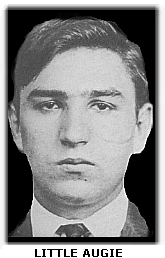 When Police Captain Cornelius W. Willemse hauled Dropper down to Essex Market Court in a taxi one day, an under-sized immigrant boy named Louis Cohen poked a revolver through the rear window of the cab and pumped three bullets into the gang leader. The boy, 17, had slipped through a cordon of eighty detectives to carry out the deed. He said the Little Augie gang hopped him up on liquor and cocaine and told him he'd be the biggest man in New York if he "croaked" Kid Dropper. With the help of an eloquent lawyer named James J. Walker, later Mayor, the boy beat the chair and got off with fifteen years, only to die by the bullet himself in 1939. When Police Captain Cornelius W. Willemse hauled Dropper down to Essex Market Court in a taxi one day, an under-sized immigrant boy named Louis Cohen poked a revolver through the rear window of the cab and pumped three bullets into the gang leader. The boy, 17, had slipped through a cordon of eighty detectives to carry out the deed. He said the Little Augie gang hopped him up on liquor and cocaine and told him he'd be the biggest man in New York if he "croaked" Kid Dropper. With the help of an eloquent lawyer named James J. Walker, later Mayor, the boy beat the chair and got off with fifteen years, only to die by the bullet himself in 1939.
����������� * * *
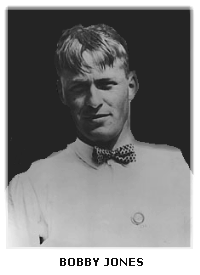 Robert Tyre Jones Jr., called Bobby, won the National Open golf championship. The stocky Atlanta boy was only twenty-one but he had been on the golf circuit seven years, knocking on the door all the time. To win the big one, he had to beat defending champion Gene Sarazen, Walter Hagen, Bobby Cruikshank and Jock Hutchinson. He won it on the eighteenth hole after coming up to it tied with the other Bobby at 296 strokes each. He would reign on the links all through the Golden Age of Sports and past it . . . Lou Gehrig, a local boy, from Commerce High School and Columbia University, played first base for the Yankees in a few games and was
Robert Tyre Jones Jr., called Bobby, won the National Open golf championship. The stocky Atlanta boy was only twenty-one but he had been on the golf circuit seven years, knocking on the door all the time. To win the big one, he had to beat defending champion Gene Sarazen, Walter Hagen, Bobby Cruikshank and Jock Hutchinson. He won it on the eighteenth hole after coming up to it tied with the other Bobby at 296 strokes each. He would reign on the links all through the Golden Age of Sports and past it . . . Lou Gehrig, a local boy, from Commerce High School and Columbia University, played first base for the Yankees in a few games and was 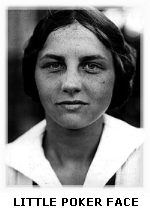 shipped to Hartford, in the minors. Manager Miller Huggins said he needed a little more seasoning . . . In tennis, a 17-year-old named Helen Wills, called Little Miss Poker Face by the sports writers, won the Women's National Singles title from Molla Mallory . . . The
Supreme Court of Arkansas upheld a school board ban on "the wearing of any transparent hosiery, or any style of dress tending toward immodesty . . . or the use of face paint or cosmetics." In the Fifties, the battle would be joined over girls wearing slacks; in the Sixties, over boys with long hair . . . In the Seventies, hot pants? shipped to Hartford, in the minors. Manager Miller Huggins said he needed a little more seasoning . . . In tennis, a 17-year-old named Helen Wills, called Little Miss Poker Face by the sports writers, won the Women's National Singles title from Molla Mallory . . . The
Supreme Court of Arkansas upheld a school board ban on "the wearing of any transparent hosiery, or any style of dress tending toward immodesty . . . or the use of face paint or cosmetics." In the Fifties, the battle would be joined over girls wearing slacks; in the Sixties, over boys with long hair . . . In the Seventies, hot pants?
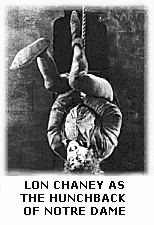 The non-fiction bestseller of 1923 was Emily Post's Etiquette, followed by Giovanni Papini's Life of Christ . . . The Mind in the Making, by James Harvey Robinson, also sold well . . . Fiction was topped by Gertrude Atherton's Black Oxen . . . Sinclair Lewis' Babbitt and Rafael Sabatini's The Sea Hawk were on the list . . . On the silent screen, adventure and the spine-chillers were big: Lon Chaney in The Hunchback of Notre Dame, Ramon Novarro in Scaramouche, Clara Bow in Down to the Sea in Ships, Harold Lloyd in
Saftey Last and Douglas Fairbanks in Robin Hood. In the theater, Broadway had Jane Cowl in Romeo and Juliet, Walter
The non-fiction bestseller of 1923 was Emily Post's Etiquette, followed by Giovanni Papini's Life of Christ . . . The Mind in the Making, by James Harvey Robinson, also sold well . . . Fiction was topped by Gertrude Atherton's Black Oxen . . . Sinclair Lewis' Babbitt and Rafael Sabatini's The Sea Hawk were on the list . . . On the silent screen, adventure and the spine-chillers were big: Lon Chaney in The Hunchback of Notre Dame, Ramon Novarro in Scaramouche, Clara Bow in Down to the Sea in Ships, Harold Lloyd in
Saftey Last and Douglas Fairbanks in Robin Hood. In the theater, Broadway had Jane Cowl in Romeo and Juliet, Walter Hampden in Cyrano�de Bergerac, Winifred Lenihan in Shaw's Saint Joan, Irene Bordoni in Little Miss Bluebeard, and W.C. Fields in Poppy . . . The great Duse died in Pittsburgh on her farewell American tour . . . Americans snapped up a half million copies of a new ballad, setting a record for sheet music sales. The song: "Yes, We Have No Bananas." Hampden in Cyrano�de Bergerac, Winifred Lenihan in Shaw's Saint Joan, Irene Bordoni in Little Miss Bluebeard, and W.C. Fields in Poppy . . . The great Duse died in Pittsburgh on her farewell American tour . . . Americans snapped up a half million copies of a new ballad, setting a record for sheet music sales. The song: "Yes, We Have No Bananas."
[ previous page ]
[ back to top ]
[ next page ]
copyright © Estate of Paul Sann
NOTICE OF COPYRIGHT
|


 It was the best of times but everybody wanted something even better. The welcome mat was out not only for the super-salesmen in the Get-Rich-Quick marts but even for the sweet-talker who was peddling nothing more than Peace of Mind, 1923-style. Thus �mile Cou� was hailed as something just short of the Messiah when he stepped off the boat from France. The bearded pharmacist had a prescription for lasting happiness, called autosuggestion and packaged it in twelve little words--"Day by day in every way I am getting better and better." Mr.Cou� said it would work on any man--or even any woman--who kept repeating it.
It was the best of times but everybody wanted something even better. The welcome mat was out not only for the super-salesmen in the Get-Rich-Quick marts but even for the sweet-talker who was peddling nothing more than Peace of Mind, 1923-style. Thus �mile Cou� was hailed as something just short of the Messiah when he stepped off the boat from France. The bearded pharmacist had a prescription for lasting happiness, called autosuggestion and packaged it in twelve little words--"Day by day in every way I am getting better and better." Mr.Cou� said it would work on any man--or even any woman--who kept repeating it. New York's Great White Way rejoiced because Police Commissioner Richard E. Enright extended the dancing curfew from 1:00 A.M. to 2:00 A.M. . . . The dance marathon, an import from Europe, began to sweep the country. A high-stepper in Tonawanda, New York, dropped dead on his eighty-seventh hour. Chicago in 1930 would stage a marathon that would go on-and on and on--for 3,327 hours . . . Greta Gustafsson made a movie in Sweden; in American movies she would be known as Greta Garbo . . . Portable radios for cars, set in clumsy wooden cases, made their bow . . . President Coolidge freed the last of the political prisoners . . . The Ouija Board was selling like hotcakes . . . Henry R. Luce and a Yale classmate, Briton Hadden, started Time . . . Norman Mailer was born in Long Branch, New Jersey . . . Earl Sande won twenty-nine stake races worth a half million dollars in purses--but the great jockey was broke when he died in
1968 . . .
New York's Great White Way rejoiced because Police Commissioner Richard E. Enright extended the dancing curfew from 1:00 A.M. to 2:00 A.M. . . . The dance marathon, an import from Europe, began to sweep the country. A high-stepper in Tonawanda, New York, dropped dead on his eighty-seventh hour. Chicago in 1930 would stage a marathon that would go on-and on and on--for 3,327 hours . . . Greta Gustafsson made a movie in Sweden; in American movies she would be known as Greta Garbo . . . Portable radios for cars, set in clumsy wooden cases, made their bow . . . President Coolidge freed the last of the political prisoners . . . The Ouija Board was selling like hotcakes . . . Henry R. Luce and a Yale classmate, Briton Hadden, started Time . . . Norman Mailer was born in Long Branch, New Jersey . . . Earl Sande won twenty-nine stake races worth a half million dollars in purses--but the great jockey was broke when he died in
1968 . . .
 Tallulah Bankhead, unhappy with her notices from the New York critics, went to London and scored a smash in The Dancers . . . Hart Crane was working on his quasi-historical poem, The Bridge, but it would not be published until 1930 . . . Nicola Sacco went on a thirty-one-day hunger strike in a Massachusetts prison . . . Sarah Bernhardt died in Paris at seventy-eight . . . A. Conan Doyle, creator of Sherlock Holmes, came to the States with a photograph purportedly showing the faces of the war dead peeking in on a memorial service in London. Sir Arthur had strong connections in the spirit world . . . Britain barred boys and girls under eighteen from drinking in the pubs.
Tallulah Bankhead, unhappy with her notices from the New York critics, went to London and scored a smash in The Dancers . . . Hart Crane was working on his quasi-historical poem, The Bridge, but it would not be published until 1930 . . . Nicola Sacco went on a thirty-one-day hunger strike in a Massachusetts prison . . . Sarah Bernhardt died in Paris at seventy-eight . . . A. Conan Doyle, creator of Sherlock Holmes, came to the States with a photograph purportedly showing the faces of the war dead peeking in on a memorial service in London. Sir Arthur had strong connections in the spirit world . . . Britain barred boys and girls under eighteen from drinking in the pubs. The first transatlantic radio news dispatches were broadcast to England from New Jersey . . . In Columbia, Missouri, fifty women attended the hanging of a Negro accused of assaulting a fourteen-year-old girl . . . The Senate voted a $5,000 annual pension to President Harding's widow . . . Henry Ford said no, he would not run against Calvin Coolidge for President . . . Thomas E. Dewey was graduated from the University of Michigan . . . Bad liquor killed fourteen persons during the New Year's celebration in York . . . Dr. Ales Hrdlicka, a leading anthropologist, said that man did not descend directly from the ape we knew then but had his origin 400,000 years�ago in Europe . . . Clarence Darrow and William Jennings Bryan debated fundamentalism vs. evolution in the Chicago Tribune . . . The Equal Rights Amendment for Women was introduced in Congress and would go into the hopper every year thereafter before the House embraced it, 350 to 15, in 1970 (Women's Lib, you know) . . . U.S. Steel abolished the
twelve-hour day and came down to ten . . .
The first transatlantic radio news dispatches were broadcast to England from New Jersey . . . In Columbia, Missouri, fifty women attended the hanging of a Negro accused of assaulting a fourteen-year-old girl . . . The Senate voted a $5,000 annual pension to President Harding's widow . . . Henry Ford said no, he would not run against Calvin Coolidge for President . . . Thomas E. Dewey was graduated from the University of Michigan . . . Bad liquor killed fourteen persons during the New Year's celebration in York . . . Dr. Ales Hrdlicka, a leading anthropologist, said that man did not descend directly from the ape we knew then but had his origin 400,000 years�ago in Europe . . . Clarence Darrow and William Jennings Bryan debated fundamentalism vs. evolution in the Chicago Tribune . . . The Equal Rights Amendment for Women was introduced in Congress and would go into the hopper every year thereafter before the House embraced it, 350 to 15, in 1970 (Women's Lib, you know) . . . U.S. Steel abolished the
twelve-hour day and came down to ten . . . A federal judge ruled that the Prohibition Law did not limit the number of liquor prescriptions doctors could write . . . Navy Lieutenant Alford I. Williams, a former Giant pitcher, flew a Curtiss monoplane 243.67 miles per hour--a new world's speed record . . . Ex-President Wilson charged that our isolation form our allies was "cowardly and dishonorable."
A federal judge ruled that the Prohibition Law did not limit the number of liquor prescriptions doctors could write . . . Navy Lieutenant Alford I. Williams, a former Giant pitcher, flew a Curtiss monoplane 243.67 miles per hour--a new world's speed record . . . Ex-President Wilson charged that our isolation form our allies was "cowardly and dishonorable." When Police Captain Cornelius W. Willemse hauled Dropper down to Essex Market Court in a taxi one day, an under-sized immigrant boy named Louis Cohen poked a revolver through the rear window of the cab and pumped three bullets into the gang leader. The boy, 17, had slipped through a cordon of eighty detectives to carry out the deed. He said the Little Augie gang hopped him up on liquor and cocaine and told him he'd be the biggest man in New York if he "croaked" Kid Dropper. With the help of an eloquent lawyer named James J. Walker, later Mayor, the boy beat the chair and got off with fifteen years, only to die by the bullet himself in 1939.
When Police Captain Cornelius W. Willemse hauled Dropper down to Essex Market Court in a taxi one day, an under-sized immigrant boy named Louis Cohen poked a revolver through the rear window of the cab and pumped three bullets into the gang leader. The boy, 17, had slipped through a cordon of eighty detectives to carry out the deed. He said the Little Augie gang hopped him up on liquor and cocaine and told him he'd be the biggest man in New York if he "croaked" Kid Dropper. With the help of an eloquent lawyer named James J. Walker, later Mayor, the boy beat the chair and got off with fifteen years, only to die by the bullet himself in 1939.
 Robert Tyre Jones Jr., called Bobby, won the National Open golf championship. The stocky Atlanta boy was only twenty-one but he had been on the golf circuit seven years, knocking on the door all the time. To win the big one, he had to beat defending champion Gene Sarazen, Walter Hagen, Bobby Cruikshank and Jock Hutchinson. He won it on the eighteenth hole after coming up to it tied with the other Bobby at 296 strokes each. He would reign on the links all through the Golden Age of Sports and past it . . . Lou Gehrig, a local boy, from Commerce High School and Columbia University, played first base for the Yankees in a few games and was
Robert Tyre Jones Jr., called Bobby, won the National Open golf championship. The stocky Atlanta boy was only twenty-one but he had been on the golf circuit seven years, knocking on the door all the time. To win the big one, he had to beat defending champion Gene Sarazen, Walter Hagen, Bobby Cruikshank and Jock Hutchinson. He won it on the eighteenth hole after coming up to it tied with the other Bobby at 296 strokes each. He would reign on the links all through the Golden Age of Sports and past it . . . Lou Gehrig, a local boy, from Commerce High School and Columbia University, played first base for the Yankees in a few games and was  shipped to Hartford, in the minors. Manager Miller Huggins said he needed a little more seasoning . . . In tennis, a 17-year-old named Helen Wills, called Little Miss Poker Face by the sports writers, won the Women's National Singles title from Molla Mallory . . . The
Supreme Court of Arkansas upheld a school board ban on "the wearing of any transparent hosiery, or any style of dress tending toward immodesty . . . or the use of face paint or cosmetics." In the Fifties, the battle would be joined over girls wearing slacks; in the Sixties, over boys with long hair . . . In the Seventies, hot pants?
shipped to Hartford, in the minors. Manager Miller Huggins said he needed a little more seasoning . . . In tennis, a 17-year-old named Helen Wills, called Little Miss Poker Face by the sports writers, won the Women's National Singles title from Molla Mallory . . . The
Supreme Court of Arkansas upheld a school board ban on "the wearing of any transparent hosiery, or any style of dress tending toward immodesty . . . or the use of face paint or cosmetics." In the Fifties, the battle would be joined over girls wearing slacks; in the Sixties, over boys with long hair . . . In the Seventies, hot pants? The non-fiction bestseller of 1923 was Emily Post's Etiquette, followed by Giovanni Papini's Life of Christ . . . The Mind in the Making, by James Harvey Robinson, also sold well . . . Fiction was topped by Gertrude Atherton's Black Oxen . . . Sinclair Lewis' Babbitt and Rafael Sabatini's The Sea Hawk were on the list . . . On the silent screen, adventure and the spine-chillers were big: Lon Chaney in The Hunchback of Notre Dame, Ramon Novarro in Scaramouche, Clara Bow in Down to the Sea in Ships, Harold Lloyd in
Saftey Last and Douglas Fairbanks in Robin Hood. In the theater, Broadway had Jane Cowl in Romeo and Juliet, Walter
The non-fiction bestseller of 1923 was Emily Post's Etiquette, followed by Giovanni Papini's Life of Christ . . . The Mind in the Making, by James Harvey Robinson, also sold well . . . Fiction was topped by Gertrude Atherton's Black Oxen . . . Sinclair Lewis' Babbitt and Rafael Sabatini's The Sea Hawk were on the list . . . On the silent screen, adventure and the spine-chillers were big: Lon Chaney in The Hunchback of Notre Dame, Ramon Novarro in Scaramouche, Clara Bow in Down to the Sea in Ships, Harold Lloyd in
Saftey Last and Douglas Fairbanks in Robin Hood. In the theater, Broadway had Jane Cowl in Romeo and Juliet, Walter Hampden in Cyrano�de Bergerac, Winifred Lenihan in Shaw's Saint Joan, Irene Bordoni in Little Miss Bluebeard, and W.C. Fields in Poppy . . . The great Duse died in Pittsburgh on her farewell American tour . . . Americans snapped up a half million copies of a new ballad, setting a record for sheet music sales. The song: "Yes, We Have No Bananas."
Hampden in Cyrano�de Bergerac, Winifred Lenihan in Shaw's Saint Joan, Irene Bordoni in Little Miss Bluebeard, and W.C. Fields in Poppy . . . The great Duse died in Pittsburgh on her farewell American tour . . . Americans snapped up a half million copies of a new ballad, setting a record for sheet music sales. The song: "Yes, We Have No Bananas."